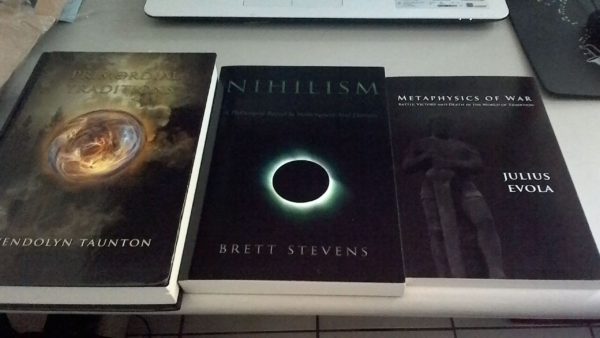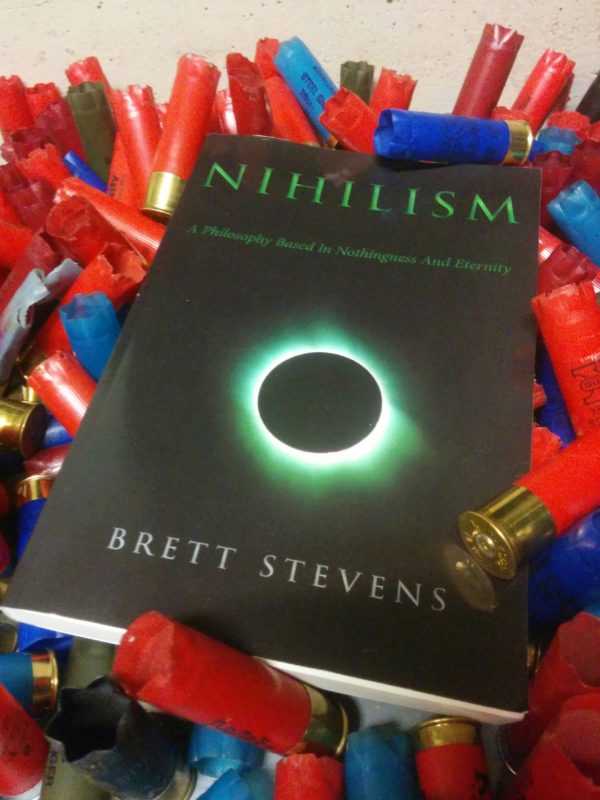Esotericist Review Of Nihilism
The first published book from your author Brett Stevens, Nihilism: A Philosophy Based In Nothingness And Eternity, was recently reviewed at Praefuscus Ferrum where its essential defiance of modernity was explored:
Nihilism is a curious concept which, much like the trials of an initiate, may serve the double function of separating the worthy from the lesser as well as exercising a transforming effect in the individual. He who is both willing and awake enough to go through a spiritual self-immolation may, like the Phoenix, return to the egg and then rise victorious upon a wider arc.
…Nihilism had then finally taken me to its utmost confines, leaving me spiritually naked and alone, no matter what the optimistic reassurances of others may be —such is the nature of extreme and empirical realism. How does this differ, then, from empiricism and realism? It differs in the psychological extent and emphasis which leads not to a mediocre accepting of reality, but rather to an extreme unveiling which ultimately leaves two options: suicide or heroism.
This interesting review uncovers the paradox at the core of nihilism: it is not a rejection of the world, but of the human image of the world pretending to be real. Human minds most easily grasp thoughts which involve simple, even divisions of reality into discrete and identical components, and express a bias for the same.
Nihilism invokes radical skepticism not of reality, but of humanity, recognizing in a Schopenhauerian context that human knowledge of reality is limited by what the brain can easily recognize. This “lazy brain” then reduces reality to data-objects in the form of human mental cognition which are not fully related to the surrounding world, or in most cases, related much at all.
As a result, nihilism present an entirely new way of viewing reality: by recognizing what we know as artifacts of our brains, we can see how empiricism and rationalism fail. Instead, we must look toward the consistency of patterns in our minds with what we know of the outside world, and compare them not directly but indirectly.
Unlike the usual modern assumptions, this system of thought is based on the idea that people are different. Some perceive more than others, which is the result of a combination of intellectual ability and instinct toward realistic truth. Nihilism is esoteric, not one-size-fits-all like ideological dogma.
What makes nihilism controversial is that it denies the split between objective and subjective. People understand “subjectively” what is “objectively” limited by their abilities and inclinations. There is no equality, which is what is required for us to believe that “subjectivity” is real, at all.
In addition, nihilism denies humanism and laughs at it. Humans are one of many species on this planet and, while some of us have abilities beyond that of ordinary animals, most of us are “talking animals with car keys” (Kam Lee). Unless we make affirmative steps to get past that state, there we remain.
Nihilism introduces a new view: the last millennium of Western history has been a failure because, following what the Herd wants, our civilization has pursued illusions in the human mind that are satisfying to that mind alone, and in doing so, has demonized reality.
If humanity is to survive, the path is found not in external collaboration, but in internal clarification that focuses on focuses on what is real not what is validated socially or according to the whims of the individual. Nihilism is a call to humanity to wake up and grow up, and stop behaving like monkeys.
So far, the book has found fans in the intersection between raging realists, the occult, Western philosophy and those simply interested in a possible future for our civilization. My appreciation goes out to all who have bought, read, and enjoyed the book.
Tags: nihilism, Nihilism: A Philosophy Based in Nothingness and Eternity












